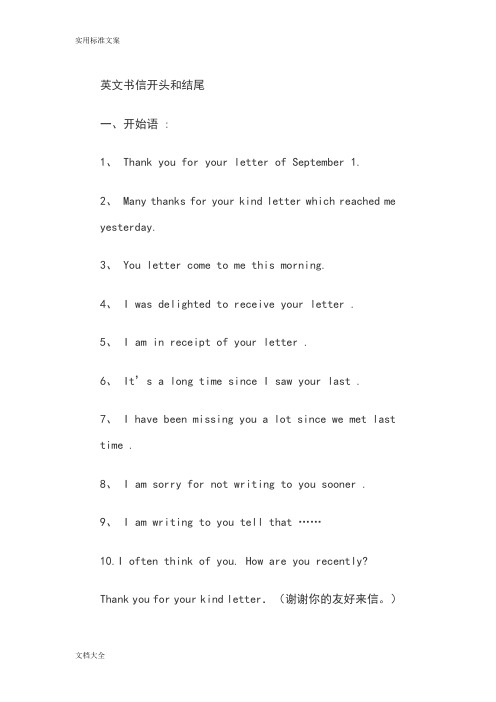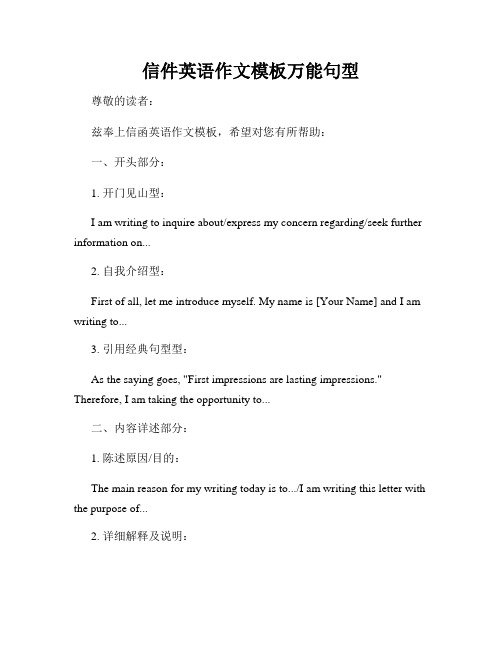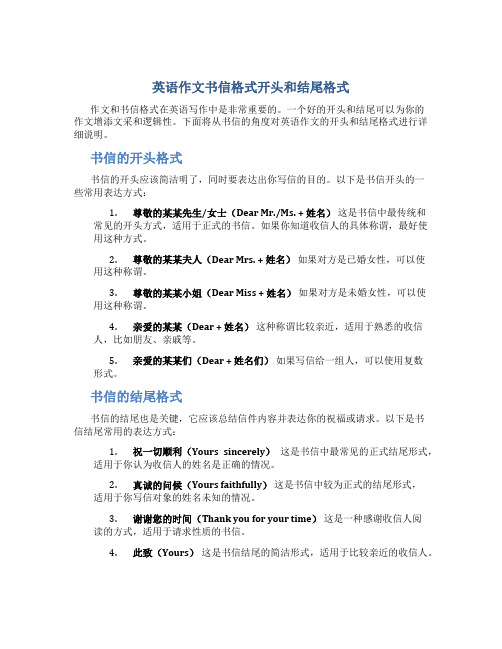英语信件开头常用语
英文书信开头和结尾

英文书信开头和结尾一、开始语 :1、 Thank you for your letter of September 1.2、 Many thanks for your kind letter which reached me yesterday.3、 You letter come to me this morning.4、 I was delighted to receive your letter .5、 I am in receipt of your letter .6、 It’s a long time since I saw your last .7、 I have been missing you a lot since we met last time .8、 I am sorry for not writing to you sooner .9、 I am writing to you tell that ……10.I often think of you. How are you recently? Thank you for your kind letter.(谢谢你的友好来信。
)I was so pleased to receive your letter.(收到你的来信我十分愉快。
)I have just received your kind letter.(已接到你的友好来信。
)I was pleased to hear from you...(……收到你的来信,我非常愉快。
)I have just this moment received your letter and I am writing at once because...(我此时收到你的来信,便立即写信,因为……)Your letter of...was duly received(你……的来函已妥收。
)Your letter came to(reached)me this morning.(今晨收到你的来信。
商务英语书信:常用开头语

商务英语书信:常用开头语(1)特此奉告……To inform one of; To say; To state; To communicate; To advise one of; To bring to one's notice (knowledge); To lay before one; To point out; To indicate; To mention; To apprise one of; To announce; To remark; To call one's attention to; To remind one of; etc.1. We are pleased to inform you that2. We have pleasure in informing you that3. We have the pleasure to apprise you of4. We have the honour to inform you that (of)5. We take the liberty of announcing to you that6. We have to inform you that (of)7. We have to advise you of (that)8. We wish to inform you that (of)9. We think it advisable to inform you that (of)10. We are pleased to have this opportunity of reminding you that (of)11. We take the advantage of this opportunity to bring before your notice12. Please allow us to call your attention to13. Permit us to remind you that (of)14. May we ask your attention to15. We feel it our duty to inform you that (of)(2)为(目的)奉告某某事项……1. The purpose of this letter is to inform you that (of)2. The purport of this line is to advise you that (of)3. The object of the present is to report you that4. The object of this letter is to tell you that5. By this letter we Purpose to inform you that (of)6. Through the present we wish to intimate to you that7. The present serves to acquaint you that(3)惠请告知某某事项……1. Please inform me that (of)2. Kindly inform me that (of)3. Be good enough to inform me that (of)4. Be so good as to inform me that (of)5. Have the goodness to inform me that (of)6. Oblige me by informing that (of)7. I should be obliged if you would inform me that (of)8. I should be glad if you would inform me that (of)9. I should esteem it a favour if you would inform me that (of)10. I will thank you to inform me that (of)11. You will greatly oblige me by informing that (of)12. We shall be obliged if you will inform us that (of)13. We shall be pleased to have your information regarding (on, as to; about)14. We shall deem it a favour if you will advise us of15. We shall esteem it a high favour if you will inform us that (of)(4)特确认,本公司某月某日函件……1. We confirm our respects of the l0th May2. We confirm our letter of the l0th of this month3. We confirm our last letter of the l0th June4. We had the pleasure of writing you last on the l0th of this month5. We confirm our respects of the l0th June6. We confirm the remarks made in our respects of thel0th July7. We confirm the particulars of our enquiry by telephone of this morning8. In confirming our telegram of this morning, ---9. Confirming our respects of the 10th May,---10. Confirming our last of the 10th June,---(5)贵公司某月某日函电,敬悉……。
信件英语作文模板万能句型

信件英语作文模板万能句型尊敬的读者:兹奉上信函英语作文模板,希望对您有所帮助:一、开头部分:1. 开门见山型:I am writing to inquire about/express my concern regarding/seek further information on...2. 自我介绍型:First of all, let me introduce myself. My name is [Your Name] and I am writing to...3. 引用经典句型型:As the saying goes, "First impressions are lasting impressions." Therefore, I am taking the opportunity to...二、内容详述部分:1. 陈述原因/目的:The main reason for my writing today is to.../I am writing this letter with the purpose of...2. 详细解释及说明:To elaborate on the matter, I would like to provide some additional information. Firstly,... Secondly,... Lastly,...3. 举例阐述:To illustrate this point, allow me to provide an example. For instance,...4. 表达关切/建议:I am concerned about... and I would like to suggest/implement... In my opinion,...5. 表达感谢/赞扬:I would like to express my sincere gratitude for... I truly appreciate...三、结尾部分:1. 期待回复:I am looking forward to receiving your prompt response/positive feedback/assistance on this matter...2. 再次感谢:Thank you once again for your attention and support. Your prompt response/action would be highly appreciated.3. 虚礼结束语:Yours faithfully/sincerely/respectfully,希望以上信函英语作文模板能够满足您的需求。
英语作文书信格式开头和结尾格式

英语作文书信格式开头和结尾格式作文和书信格式在英语写作中是非常重要的。
一个好的开头和结尾可以为你的作文增添文采和逻辑性。
下面将从书信的角度对英语作文的开头和结尾格式进行详细说明。
书信的开头格式书信的开头应该简洁明了,同时要表达出你写信的目的。
以下是书信开头的一些常用表达方式:1.尊敬的某某先生/女士(Dear Mr./Ms. + 姓名)这是书信中最传统和常见的开头方式,适用于正式的书信。
如果你知道收信人的具体称谓,最好使用这种方式。
2.尊敬的某某夫人(Dear Mrs. + 姓名)如果对方是已婚女性,可以使用这种称谓。
3.尊敬的某某小姐(Dear Miss + 姓名)如果对方是未婚女性,可以使用这种称谓。
4.亲爱的某某(Dear + 姓名)这种称谓比较亲近,适用于熟悉的收信人,比如朋友、亲戚等。
5.亲爱的某某们(Dear + 姓名们)如果写信给一组人,可以使用复数形式。
书信的结尾格式书信的结尾也是关键,它应该总结信件内容并表达你的祝福或请求。
以下是书信结尾常用的表达方式:1.祝一切顺利(Yours sincerely)这是书信中最常见的正式结尾形式,适用于你认为收信人的姓名是正确的情况。
2.真诚的问候(Yours faithfully)这是书信中较为正式的结尾形式,适用于你写信对象的姓名未知的情况。
3.谢谢您的时间(Thank you for your time)这是一种感谢收信人阅读的方式,适用于请求性质的书信。
4.此致(Yours)这是书信结尾的简洁形式,适用于比较亲近的收信人。
5.希望尽快回复(Looking forward to your reply)这是一种期待对方回复的方式,适用于需要对方回复的书信。
书信的格式虽然简单,但其中的细节却可以展现出你的文采和修养。
合适的开头和结尾可以使你的信件更具说服力,希望以上内容对你有所帮助。
英文信件开头100例

英文信件开头100例英文信件开头100例英文信件开头〔一〕:1、I am writing to you tell that2、.I often think of you. How are you recently?3、You letter e to me this morning.4、Its a long time since I saw your last .5、I am in receipt of your letter .6、I have been missing you a lot since we met last time .7、I was delighted to receive your letter .8、Many thanks for your kind letter which reached me yesterday.9、Thank you for your letter of September .10、I am sorry for not writing to you sooner .英文信件开头〔二〕:1〕Havent seen you for ages,Im writing toyou to...好久不见,我写信是为了...2〕Im writing to you on the purpose of...我写信的目的是...3〕I want to give you some advice on...我想给你一些关于...的提议。
英文信件开头〔三〕:1、Im writing to you about the lecture to be given next Monday.2、Thank you for your letter.3、How time flies! Its three months since I saw you last.4、Let me tell you that5、I have received your letter of July the th.6、Im writing to ask if you can e next week.7、In reply to your letter about (the exhibition this year);8、You letter came to me this morning.英文信件开头〔四〕:1) I am glad to receive your letter askingfor...[由整理]很高兴收到你的来信询问...2〕It is my pleasure togive you some suggestions on...很高兴给你一些关于...的提议。
商务英语信件开头语

商务英语信件开头语商业书信常用开头语(1)特此奉告等To inform one of; T o say; To state; T o communicate; To advise one of; To bring to one's notice (knowledge); To lay before one; To point out; To indicate; To mention; To apprise one of; To announce; To remark; To call one's attention to; To remind one of; etc.1. We are pleased to inform you that2. We have pleasure in informing you that3. We have the pleasure to apprise you of4. We have the honour to inform you that (of)5. We take the liberty of announcing to you that6. We have to inform you that (of)7. We have to advise you of (that)8. We wish to inform you that (of)9. We think it advisable to inform you that (of)10. We are pleased to have this opportunity of reminding you that (of)11. We take the advantage of this opportunity to bring before your notice12. Please allow us to call your attention to13. Permit us to remind you that (of)14. May we ask your attention to15. We feel it our duty to inform you that (of)(2)为(目的)奉告某某事项1. The purpose of this letter is to inform you that (of)2. The purport of this line is to advise you that (of)3. The object of the present is to report you that4. The object of this letter is to tell you that5. By this letter we Purpose to inform you that (of)6. Through the present we wish to intimate to you that7. The present serves to acquaint you that(3)惠请告知某某事项,等1. Please inform me that (of)2. Kindly inform me that (of)3. Be good enough to inform me that (of)4. Be so good as to inform me that (of)5. Have the goodness to inform me that (of)6. Oblige me by informing that (of)7. I should be obliged if you would inform me that (of)8. I should be glad if you would inform me that (of)9. I should esteem it a favour if you would inform me that (of)10. I will thank you to inform me that (of)11. You will greatly oblige me by informing that (of)12. We shall be obliged if you will inform us that (of)13. We shall be pleased to have your information regarding (on, as to; about)14. We shall deem it a favour if you will advise us of15. We shall esteem it a high favour if you will inform us that (of)(4)特确认,本公司某月某日函件等1. We confirm our respects of the l0th May2. We confirm our letter of the l0th of this month3. We confirm our last letter of the l0th June4. We had the pleasure of writing you last on the l0th of this month5. We confirm our respects of the l0th June6. We confirm the remarks made in our respects of the l0thJuly7. We confirm the particulars of our enquiry by telephone of this morning8. In confirming our telegram of this morning, --9. Confirming our respects of the 10th May,---10. Confirming our last of the 10th June,---(5)贵公司某月某日函电,敬悉等l. We have pleasure in acknowledging receipt of your esteemedfavour of the 3rd May2. We are pleased to acknowledge receipt of your favour of the lst June3. We have to acknowhedge receipt of your favour of the 5th July4. Your letter of May 5 was very welcome5. Your letter of April l0 gave me much pleasure6. Your esteemed favour of 7th May was duly received by us7. Your favour of the 5th June is duly to hand8. Your favour of the l0th is to (at) hand9. We are in due receipt of your favour dated the 7th June10. We are in receipt of your letter of the 7th July11. We are in possession of your letter of the 5th April12. We have duly received your favour of the 5th March13. Your letter of yesterday's date is duly to (at) hand14. Your esteemed communication of yesterday's date is just to (at) hand15. We thank you for your favour of the 5th May16. We are obliged for your letter of the 5th May17. Many thanks for your letter of the 5th June18. Very many thanks for your letter of May 519. In acknowledging receipt of your letter of the 5th June, ...20. Your favour of the 5th May has just reached me21. Your favour of the 5th May is duly received22. Your favour of the 5th May is now before me23. Your promised letter under date (of) the 5th June has just reached us(6)特回答贵公司某月某日函所叙述有关事项等1. I have the pleasure of stating, in answer to your inquiry of the 4th inst, that2. In reply to your letter of the 5th of May, I have to inform you that (of)3. I hasten to answer your inquiry of the l5th May, by stating that4. We are in receipt of yours of the 5th June, in reply to which we are pleased to state that5. In reply to yours of the l0th May, relative to..., I would say that6. I am in receipt of your favour of the 7th May, and in responseI inform you that (of)7. In response to your letter of l0th May, I wish to say that8. In answer to your favour of the 5th May regarding... I reply as follows:9. Answering your letter of the 8th of February re..., I would say that10. In reply to your letter of February 8th, I inform you that (of)11. Replying to yours of the 8th of February regarding..., I would say that12. Replying to your favour under date of February 8th re...,I say that(7)非常遗憾,我们奉告您关于,等。
(完整)英语书信的开头结尾语

(完整)英语书信的开头结尾语英语书信的开头结尾语正文的开头语1。
I was so pleased to receive your letter…(I was pleased to hear from you...) ……收到你的来信,我非常高兴.2. Thank you for your kind letter…(…友好来信)Your kind letter gives me much pleasure。
你的来信给我带来了无比的快乐.3. Sorry for delaying this letter so long.(这封信耽搁了很久了,真对不起。
) ( I am sorry it has taken me a long time to reply to your last letter but…)(很抱歉,这么久才回你的上次来信,只是……)4。
I have just this moment received your letter and I am writing at once because.我此时收到你的来信,便立即写信,因为…5。
Your letter came to(reached)me this morning.今晨收到你的来信.6。
Many thanks for your last kind letter.(接最近来信,感激之至.)From your letter I learned that.从你的信中知道……7. What a surprise it was to get a letter from you.收到你的来信我感到很吃惊。
8. I often think of you. How have you been recently ?我常想到你,你近来好吗?9。
I have the pleasure to tell you that(我高兴地告诉你…)How are you getting on with your English study?你英语学得怎么样了?10。
英语书信万能开头结尾带翻译

英语书信万能开头结尾带翻译Introduction:在现代社会,书信依然是人们进行沟通和交流的重要方式。
无论是与朋友、家人、同事还是商业伙伴之间,撰写一封能够准确传达信息、表达感情的英语书信非常重要。
然而,对于许多人来说,写英语书信可能是一项挑战。
本文将介绍一些英语书信的万能开头和结尾,并提供对其的翻译,以帮助您更好地应对书信写作。
Body:一、英语书信的万能开头:1. Dear [名字],亲爱的[名字],这是书信中最常见的开头之一。
通过简单地使用收信人的名字,您可以向他们表达亲近和尊重之情。
2. To whom it may concern,致未知收件人,这是书信中更正式的一种开头方式。
当您不清楚收信人的具体姓名时,可以使用这个开头。
3. Dear Sir/Madam,尊敬的先生/女士,这是一个更正式的开头,适用于您写给未知性别的收信人或所写信件的内容较为正式的情况。
4. Hello/Hi,你好/嗨,这是一种比较随意和友好的开头方式,适用于您写给熟悉且亲近的朋友或家人的情况。
5. Dear [亲密关系的称呼],亲爱的[亲密关系的称呼],这是一种在书信中表达亲密关系的方式,比如写给配偶、父母、兄弟姐妹等。
二、英语书信的万能结尾:1. Yours sincerely,您真诚的,这是书信中最常见的结尾方式之一,适用于正式书信,如求职信或商业信函。
它表示您对收信人的真诚和尊重。
2. Yours faithfully,您忠诚的,这是一种更正式的结尾方式,适用于您不太熟悉的收信人或更正式的场合。
3. Best regards,最好的问候,这是一种通用的结尾方式,适用于大部分情况下。
它表示对收信人的良好祝愿和问候。
4. With love,充满爱意的,这是一种在给亲密关系的人写信时使用的结尾方式。
它表示您对收信人的深情厚意。
5. Yours truly,您真实的,这是一种比较正式且礼貌的结尾方式,适用于业务信函或正式的请求信件。
- 1、下载文档前请自行甄别文档内容的完整性,平台不提供额外的编辑、内容补充、找答案等附加服务。
- 2、"仅部分预览"的文档,不可在线预览部分如存在完整性等问题,可反馈申请退款(可完整预览的文档不适用该条件!)。
- 3、如文档侵犯您的权益,请联系客服反馈,我们会尽快为您处理(人工客服工作时间:9:00-18:30)。
信件开头常用语You letter came to me this morning.I have received your letter of July the 20th.I’m writing to you about the lecture to be given next Monday.I’m writing to ask if you can come next week.How time flies! It’s three months since I saw you last.Thank you for your letter.In reply to your letter about (the exhibition this year)…;Let me tell you that…信件结尾常用语Please remember me to your whole family.Give my best regards (wishes) to your mother.Best wishes.With love.Wish you a pleasant journey.Wish you success. Wish you the best of health. (luck)Looking forward to your next visit to China.Looking forward to the pleasure of meeting you.Expecting to hear from you as soon as possible.英语书面表达中过渡词的使用根据意思和作用的不同,过渡词可以分为以下十五类:(1)表并列关系的过渡词:and, also, as well, as well as,or, too, not only ... but also, both ... and, either ... or, neither ... nor (2)表递进关系的过渡词:besides, in addition(加之,除……之外), moreover (此外,而且), what’s more(更重要的是),what’s worse(更糟糕的是)(3)表转折对比的过渡词:but, however, yet, instead, on the other hand, on the contrary(相反), although, despite, in spite of, whereas(而), unlike, nevertheless(然而), not only ... but also, here ... there,years ago ... today, this ... that, the former ... the latter, then ... now, the first ...whereas the second, once ... now, on the one hand ... on the other hand, some ... others(4)表原因的过渡词:because, because of, since, as, for, now that, thanks to, due to(由于)(5)表结果的过渡词:so, thus, therefore, as a result, so that, then, thereby(从而), hence(因此), so ... that, such ... that (6)表条件的过渡词:if, unless, on condition that(条件是), as/ so long as(只要)(7)表时间的过渡词:when, while, after, before, until, as soon as, later, afterwards(事后), soon, lately, recently, since, from then on,eventually, in the meantime, then, suddenly, at the same time, next, early this morning / year / century, after a while, in a few days, now, presently, finally, at last, all of a sudden, from now on, at present, immediately, the moment(8)表特定的顺序关系的过渡词:first, firstly, second, secondly, third, thirdly, above all, first of all, then, next, finally, in the end, atlast, afterward(s) (后来), meanwhile(几乎同时), thereafter(在那以后), last, finally, eventually (终于)(9)表换一种方式表达的过渡词:in other words, that is to say, to put it another way(10)表进行举例说明的过渡词:for instance, for example, like, such as(11)表陈述事实的过渡词:in fact, actually, as a matter of fact, to tell you the truth(12)表强调的过渡词:certainly, indeed, above all, surely, most important, in fact, no doubt, without any doubt, truly, obviously(13)表比较的过渡词:like, unlike, in the same way, similarly, similar to(14)表目的的过渡词:for this reason, for this purpose(为此), so that, in order to, so as to (15)表总结的过渡词:in a word(总之,简言之), in general, in short(总之), above all, after all, generally speaking, to sum up, finally, in conclusion, at last, in summary2. 文章段落之间的逻辑关系主要由过渡词来完成,在修辞中称为启、承、转、合。
“启”就是开头, “承”是承接,“转”是转折,“合”是综合或总结。
(1)用于“启”的过渡词语(常用在段落或文章的开头)first, first of all, at first, in the first place, firstly, to start with, recently, now, at present, in recent years, in general, generally speaking, at present, lately, currently,It is often said that ...As the proverb says ...It goes without saying that ...It is clear / obvious that ...Many people often ask ...(2)用于“承”的过渡词语(通常用在段落中的第一个扩展句中)second, similarly, in addition, besides, then, furthermore, moreover, what is more, what is worse, for example, for instance, certainly, surely, obviously, in other words, especially, particularly, in particular, indeed, still, third, truly, in fact, at the same time, no doubt,It is true that ...Everybody knows that ...It can be easily proved that ...No one can deny that ...The reason why ... is that ...There is no doubt that ...To take ... for an example (instance)...We know that ...What is more serious is that ...(3)用于“转”的过渡词语(通常用在段落中的第二个扩展句中)but, however, on the other hand, on the contrary, in contrast, in any case, at any rate(无论如何), nevertheless(虽然如此), otherwise, or, or else, while, whereas, but, despite, in spite of ... , yet, instead,I do not believe that ...Perhaps you’ll ask why ...This may be true, but we still have a problem with regard to ...Though we are in basic agreement with ..., yet differences will be found,That’s why I feel that ...(4)用于“合”的过渡词语(通常用在段落的结论句或文章的结论段中)in a word, in general, in short, above all, after all, generally speaking,to sum up, finally, in conclusion, at last, in summary, therefore, as a result, above all, thus,after all(毕竟), eventually, hence, in short, in conclusion, in a word, in sum(总之), on the whole(就整体而言), to sum up From this point of view ...On account of this we can find that ...The result is dependent on ...Thus, this is the reason why we must ...。
